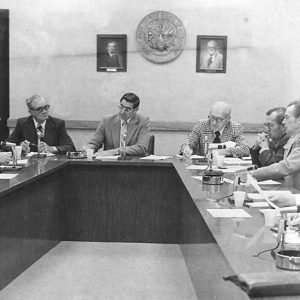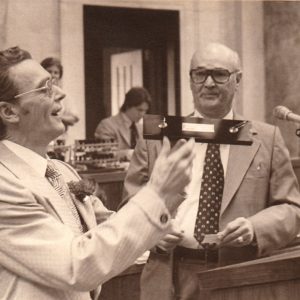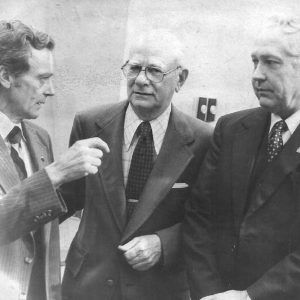calsfoundation@cals.org
John Eldon Miller (1929–2014)
John Miller of Izard County was a longtime Arkansas state legislator. Starting his tenure in the Arkansas House of Representatives in 1959, he became renowned for his budgetary expertise. Only when term limits prohibited him from running after his twentieth term did Miller step aside in 1998.
John Eldon Miller was born on March 2, 1929, in Melbourne (Izard County). One of ten children of Green H. Miller and Annie Gray Miller, he lived in Izard County for all but one year of his life. Majoring in chemistry, Miller graduated from what is now Arkansas State University in Jonesboro (Craighead County) in 1949. On November 5, 1949, he married Roby Lenora Robertson; they had three children: a son and two daughters. Following graduation from college, Miller achieved considerable success in insurance, real estate, and construction. He also owned a working farm and served as county and circuit clerk in Izard County. Then, in 1958, running as a Democrat, he won election to the Arkansas House of Representatives. Taking his seat in 1959, he found his passion in the legislative process.
Over the course of his almost forty years in the House, he represented Izard County and portions of Independence and Sharp counties. While the Arkansas legislature is a part-time body, political observers noted that Miller approached it like a full-time job, staying in Little Rock (Pulaski County) from Monday through Friday, often even when the legislature was not in session. He served as speaker of the House in 1979 and 1980, but his greatest influence was in the budgetary realm, where he mastered the intricacies of the budget and tax processes in ways that made him an invaluable resource for legislators across the ideological spectrum. He developed this distinctive expertise through stints on the House Revenue and Taxation Committee, the House Insurance and Commerce Committee, the Joint Committee on Advanced Communications and Information Technology, and the Joint Committee on Energy. Miller also served as the House chairman of the Joint Budget Committee.
Equally important was his broad-based approach to governing. He zealously represented his own district, securing a vocational-technical school in Melbourne and later helping in its upgrade to a two-year technical state college (now Ozarka College). In addition, he led the establishment of the North Central Unit correctional facility—a controversial decision but one he defended as bringing in new jobs. However, Miller also worked hard to improve the state beyond his district, leading effort to create the office mall on the capitol grounds in Little Rock, a project he believed would foster greater communication and efficiency within the government.
Miller had an almost prudish personal style. He did not drink alcohol or smoke or curse. When he expressed concern about the paintings of “nekkid women” (as the local press reported) hanging in the Arkansas State Capitol as part of a state-sponsored art display, the offensive works were consigned to one of the building’s broom closets. No less memorable was the time that Miller responded to Governor Winthrop Rockefeller’s angry reference to the legislature as “those bastards” by taking to the House floor and tearfully defending the virtue of his mother.
His influence and reputation were not limited to Arkansas. Miller represented the state on the Fiscal Affairs and Government Operations Committee of the Southern Legislative Conference (SLC), and he served as chairman of the SLC and of the Council of State Governments.
Miller was also an active and dedicated civic contributor. He served on the Arkansas Development Disabilities Planning Council, as well as on the board of trustees of Ouachita Baptist University (OBU) in Arkadelphia (Clark County). A consistent booster of local businesses, he served on the chambers of commerce in Melbourne, Batesville (Independence County), Calico Rock (Izard County), and Horseshoe Bend (Izard County). Miller was also a member of the board of directors of the Calico Rock Medical Center, the Arkansas Easter Seals Society, the North Arkansas Human Services Systems, Inc., the Lions World Services for the Blind, and the White River Planning and Development District Advocacy Services, Inc.
Forced to retire in 1998 due to the state’s recently adopted term limits, Miller was held up by some critics of the limits as an example of what would be lost in complying with the new regulations.
Miller died on June 18, 2014, at his home in Melbourne. He is buried in Melbourne Cemetery.
For additional information:
Wentling, Nikki. “Ex-Legislator Noted for Financial Acuity.” Arkansas Democrat-Gazette, June 20, 2014, p. 6B.
William H. Pruden III
Ravenscroft School


 Arkansas General Assembly, 1979
Arkansas General Assembly, 1979  John Miller Birthday
John Miller Birthday  Knox Nelson and Colleagues
Knox Nelson and Colleagues 



Comments
No comments on this entry yet.